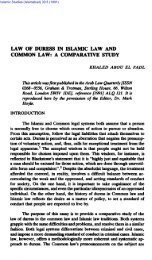THE BEGINNING OF MUSLIM HISTORICAL RESEARCH*
THE BEGINNING OF MUSLIM HISTORICAL RESEARCH*
THE BEGINNING OF MUSLIM HISTORICAL RESEARCH*
You also want an ePaper? Increase the reach of your titles
YUMPU automatically turns print PDFs into web optimized ePapers that Google loves.
MUSUM <strong>HISTORICAL</strong> RESEARCH 9<br />
and their philosophy of life more profound. To characterise the cultural<br />
atmosphere in this and the following century, the expression Islamic re-<br />
naissand~) has even been used.19 This development, which indeed<br />
constituted a kind of humanism, is most strongly and faithfully expressed<br />
in the works of al-Mas6iidi(u) (d. 956). Amongst his predecessors was<br />
the geographer al-Ya6qiibi(v) (d. ca. 900) whose history of the 'AbbBsids<br />
presents, in fact, a world history, which begins with the creation and<br />
comprehends all nations then known to the Muslims.2o And in the<br />
Annuls of apTabari(w) (838-923), the famous Qur'gn Commentator, the<br />
most extensive Chronology of the Muslims was produced.21 With<br />
al-Masbiidi22 the high water mark of this period of development of Muslim<br />
historical research was reached. He gives the most valuable account of<br />
all lands, in most of which he had himself travelled. He narrated the cus-<br />
toms and religious professions of all nations, and often compares their<br />
ieligions and philosophies of life. Through his extensive cultural and<br />
historical perspective he exercised the greatest influence on Ibn Khaldiin,<br />
who rightly considers him to be the leader (ZrnrSni) of the Muslim historians.<br />
But even he could not go beyond descriptive historical writing. Ibn Khal-<br />
diin was the first to put forward, at least in theory, a programme of his-<br />
torical research on an evolutionary and conceptualised basis, whereas<br />
before him, the philosopher Ibn Miskawayh(x) (d. ca. 1043), had repre-<br />
sented a pragmatic method of historical writing in his "Experiences of the<br />
Nations".<br />
Author's Notes<br />
1. This significant position of Ibn Khaldlin in the history of sciena has been brought<br />
into prominence by R. Hint in his History of the PhiBmphy of History (min-<br />
burgh: 1893). pp. 157-171.<br />
2. Prolegomena of Ibn Khaldan, in notices d extraits du manusWts & la bibliotkque<br />
du roi, vols. 16, 17, 18 (Arabic text) 19.20.21 (French translation by de Slane),<br />
16 Paris 1858. p. 56. (19. Paris: 1863: p. 71). The French translation, "I'etat<br />
mid de I'homme" does not give the exact rendering of the Arabic expression al-<br />
Zjtimci' akZndd which means "the process of human association or the formation<br />
of human groups". Here the active meaning of the verbal form is to be taken into<br />
cansideration which also gets priority in the description of Ibn Khaldan.<br />
5. C. Brockelmann, Guchichte der arabischm Linemtw (Literatures of the East, Vol.<br />
6.B). (Leipzig: 1901). p. 101.
















